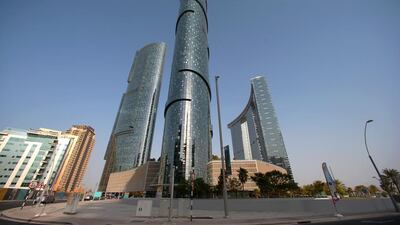Property prices are expected to remain in decline in Abu Dhabi throughout 2017, as the weak economic outlook and more project completions impact on all sectors of the market, according to CBRE.
The property consultancy’s Q1 Abu Dhabi Market View report states that residential rents have dropped by 8 per cent year-on-year, while commercial office rents are 5 per cent lower over the same period. It also quoted STR Global figures showing that revenues per available room (RevPar) also dropped by 8.5 per cent year-on-year to the end of March.
It said that the office market “continues to suffer from weakening demand fundamentals due to soft economic conditions and ongoing government cost-cutting measures, which have negatively impacted demand in the commercial sector”.
Added to this, inventory levels are rising as new office projects are completed and buildings handed over, especially on Reem Island.
Matthew Green, CBRE’s UAE head of research and consultancy, said that he expects much of the 1.4 million square metres of office space due to be handed over by the end of 2019 to be delayed due to market conditions.
“We can learn from history that developments will be pushed out further and further, but it’s still a significant amount of supply,” he said.
He expects the secondary market to be worst-affected by new supply, as people trade up to improved buildings, but argued that landlords of premium, Grade A space are also facing challenges.
“Unfortunately, in a market like Abu Dhabi, some of the biggest occupiers willing to pay the higher rents have been government-related entities. We’ve had examples where some have either had to move out entirely or downsize significantly.”
The residential market is showing greater signs of resilience, he said, if only because there is not much new supply being built. Smaller, mid-market apartments are holding their rental value, Mr Green said, as people in larger units who have had housing allowances cut, seek more affordable space.
However, he said that hospitality “is one of the most challenging markets in Abu Dhabi at the moment”.
Although occupancy figures have held up reasonably well, standing at 75 per cent at the end of March, compared with 78 per cent a year earlier, the lack of demand and increasing supply has forced operators to drop prices. Average daily rates (ADR) fell 4.4 per cent in the first three months of the year, while revenue per available room is 8.5 per cent lower year-on-year at Dh396 per room, per night.
“It’s a very difficult market,” Mr Green said. “Corporates are not spending as much, governments are not spending so there is not as much work externally for consultants and business travellers. We’ve seen all of this, combined with the fact that Abu Dhabi is still emerging as a leisure destination.”
He added that the strength of the US dollar (to which the dirham is pegged) has also made tourists more cost-conscious.
“People can’t afford to spend the way they were before.”
Abu Dhabi’s Tourism & Culture Authority (TCA) said on Wednesday that it will embark this month on a promotional tour to four Chinese cities in a bid to drive tourism.
TCA said that China is now the biggest source market for international visitors, overtaking India. Almost 100,000 Chinese visitors stayed in the city between January and March this year, it said.
In September last year, it was announced that the UAE would grant Chinese tourists a visa on arrival into the UAE.
Mubarak Al Nuaimi, TCA Abu Dhabi’s director of promotions & overseas offices, said: “China has been identified as one of our priority markets. Each year we are seeing impressive growth in the number of hotel guest arrivals and the first quarter of this year has been excellent, with close to 50 per cent growth over the same period in 2016.”
mfahy@thenational.ae


